- Energy Storage & Decarbonization Pathways
- Grid Infrastructure
- Just Transition
- Project Finance
- Tax Incentives & Appropriations
- Transmission & Power Markets
- Blog
ACORE Hosts its First-Ever Virtual Grid Forum
By: Maheen Ahmad and Adam Carey
November 25, 2020
ACORE’s annual Grid Forum convenes renewable energy industry executives and thought leaders to explore the business opportunities, policy and regulatory issues, and technology challenges associated with integrating increasingly high penetrations of renewable electricity on the grid. This year, on November 17-18, ACORE hosted its first-ever virtual Grid Forum with the theme “maximizing renewables integration through grid modernization.”
Hundreds of attendees tuned in to the two-day digital event, which featured six interactive panel sessions, six keynote addresses and lively discussions among industry leaders. Read on for highlights from this year’s conference.
Adapting the Grid to High-Penetration Renewables

The first panel of the ACORE Grid Forum discussed the challenges and opportunities of moving the grid toward increasingly ambitious state renewable energy goals. It was moderated by Seth Lucia, Of Counsel at Morrison Foerster, and featured Mark Ahlstrom, Vice President of Renewable Energy Policy at NextEra Energy Resources; Jam Attari, CEO at BayWa r.e. Solar Projects; Jaya Bajpai, Head of Analytics at Lockheed Martin; and Debra Lew, Consultant at Debra Lew LLC.
Panelists described how clear federal leadership, complementary state policies, expanded interregional transmission and increased distributed energy resources could play important roles in accomplishing ambitious 2030 climate policy goals. Recognizing how new technologies can address resource variability, the group reinforced the need for stakeholder consensus and solidarity in creating a more modern electric grid infrastructure. Panelists also called for near-term grid expansion and upgrades to save on the long-term costs of updating America’s current system of segmented transmission.
Keynote Address by FERC Commissioner Richard Glick
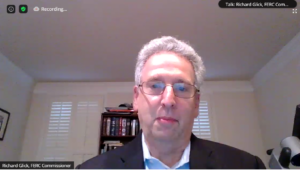
In one of his first public appearances since the presidential election, FERC Commissioner Richard Glick – the Commission’s sole Democrat – laid out his priorities under a Biden administration. In a keynote discussion, he outlined a sweeping vision that included the rollback of anti-renewable rules in the eastern capacity markets, transmission planning reforms driven by public policy goals, and the continued elimination of barriers to energy storage deployment and hybrid resource integration.
“We are going to need to build out the grid much more significantly,” the Commissioner made clear.
Keynote Interview with General Wesley Clark

In a keynote interview with ACORE President and CEO Gregory Wetstone, retired General Wesley Clark, Co-Chair of the National Commission on Grid Resilience, also spoke about how to best adapt the grid to meet today’s requirements.
He discussed grid security and the need for more grid oversight, transmission expansion, and offshore renewable resource integration to enable a robust electric grid. “We need to be open with all of the different groups connected to the grid about what the threats are,” the General stressed. “It’s not just about economics; it’s also about resilience.”
Capacity Market Design and the Future of Resource Adequacy
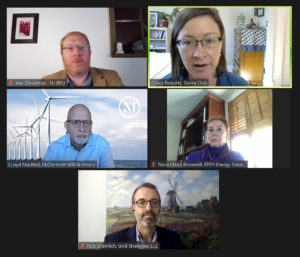
Between rolling outages in California and federal mitigation of clean energy policies in PJM and NYISO, 2020 was a challenging year for resource adequacy issues. In a panel moderated by Lloyd MacNeil, Partner at McDermott Will & Emery, the following panelists discussed the most promising ways to move forward on these issues: Nora Mead Brownell, founding Partner of EPSY Energy Solutions, former FERC Commissioner and former Chair of PG&E board; Rob Gramlich, Founder and President at Grid Strategies; Casey Roberts, Senior Attorney at Sierra Club; and Abe Silverman, General Counsel at the New Jersey Board of Public Utilities.
Speakers were tasked with reimagining resource adequacy with an eye toward advancing renewable energy. The group disagreed on the need for capacity markets, noting the trials and tribulations that PJM Interconnect has had with them and the California Independent System Operator (CAISO) has had without them. Some panelists highlighted ERCOT as a successful competitive model without capacity markets made possible by successful business leadership. The panelists discussed the necessity of addressing reliability first, and the importance of identifying who the capacity buyer is early in the market design process.
Keynote Address by CAISO Board Chair Angelina Galiteva
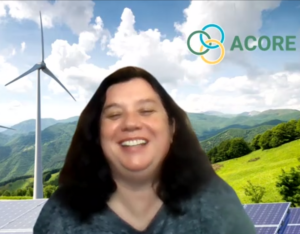
CAISO Board of Governors Chair Angelina Galiteva also commented on resource adequacy and the rolling power outages in California earlier this year during her keynote address, but stressed the climate crisis and COVID-19 pandemic were currently top of mind. She said she has no concerns with California’s 100% by 2045 clean energy goal, noting significant growth in solar and storage is expected in the state through 2030. In contrast to expectations that storage would profit through arbitrage between peaks and valleys in demand, she explained that storage in the CAISO footprint primarily supplied ancillary services. Pointing to the growing success of the Western Energy Imbalance Market, she described a positive pathway to a Western energy day-ahead market.
Deploying Power Markets to Support Renewables Expansion
Recent power market challenges are still outweighed by their benefits for renewable expansion. This was the consensus in a panel moderated by Heather Curlee, Of Counsel at Wilson Sonsini Goodrich & Rosati, and featuring Joe Hoerner, Senior Vice President for Regional Grid Solutions at PacifiCorp; Robert Helton, Vice President of Government and Regulatory Affairs at ENGIE; and Robert Stoddard, Managing Director at Berkeley Research Group.
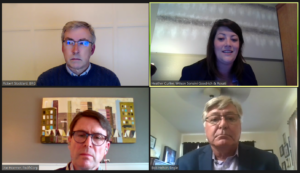
Panelists uniformly validated the importance of RTOs and ISOs in deploying renewables, as the deregulated market structure ensures easier access to the grid for new energy resources. The group discussed how RTO/ISO market structures would also allow for price signals that incentivize innovation of new renewable energy technologies. Regarding the Western Energy Imbalance Market, panelists credited the voluntary design of that market with its success and noted its ability to optimize the region’s diverse power resources for reliably meeting electricity demand.
Panelists also emphasized the importance of carbon pricing in improving the efficiency of renewable energy deployment. A price on carbon would assign a more accurate value to renewable energy sources and energy storage, allowing them to be installed more optimally and lessening solar and wind curtailment.
Keynote Address by NRECA Board President Curtis Wynn
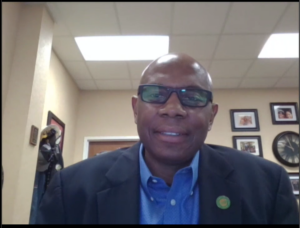
Curtis Wynn, Board President of the National Rural Electric Cooperative Association (NRECA), reiterated the importance of expanding renewable energy access, particularly to historically marginalized rural consumers, in a keynote presentation on electric cooperatives. In the past ten years, electric cooperatives have made significant progress in decarbonizing their electricity production through a combination of fuel switching and setting emissions reduction targets for power plants. NRECA is currently in the process of stewarding the Achieving Cooperative Community Equitable Solar Sources (ACCESS) program – a three-year program aimed at increasing access to solar energy for lower income consumers with fewer financial resources.
“Every member is included in the energy transition,” Wynn said.
The Role of Transmission and Grid Upgrades as Part of an Effective Climate Solution
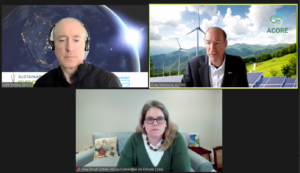
The growth of transmission and the importance of grid upgrades in the climate policy debate was the focus of a fireside chat moderated by Gregory Wetstone, ACORE’s President & CEO and featuring Ana Unruh Cohen, Staff Director at the House Select Committee on the Climate Crisis, and John Moore, Director of the Sustainable FERC Project at the Natural Resources Defense Council.
Cohen and Moore emphasized the need for a Macro Grid in the United States, remarking that this transmission-based approach to the clean energy transition is vital to reaching our climate goals. The group noted the need to avoid gigawatts of power “dying on the vine” without the ability to interconnect.
While discussing economic development and carbon emission reduction targets, panelists explained that bringing together the environmental, agricultural and renewable energy communities through coalition-building is critical to creating a winning strategy. Panelists also highlighted the need to elevate tales of renewable developer challenges to break through political logjams.
The group also agreed that ACORE’s Macro Grid Initiative puts the United States in an important position to take on the climate crisis via a grand approach to nationwide transmission buildout.
Keynote Address by Congressman Sean Casten (D-IL)
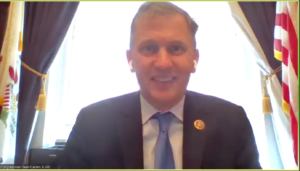
U.S. Representative Sean Casten of Illinois, a former renewable energy industry executive, emphasized the need for climate advocates to prioritize what’s scientifically necessary over what’s politically possible. In a keynote address, he outlined his wish list for a Biden Administration energy policy. Lamenting the lack of congressional leadership on climate, the Congressman noted that a range of executive agencies, including ones without the environment as their focus, must prioritize policies to meet our nation’s climate imperatives. “We do not have time to be in the unicorn sales business,” he said. Representative Casten reminded the audience that markets, when well-designed, are up to the task of decarbonizing our economy.
Financing Models for Transmission, Storage and Other Grid Resources
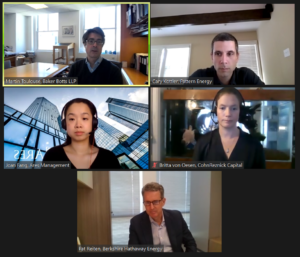
Policy is only one piece of the puzzle. Transmission, storage and other grid resources need effective financing models to accelerate their deployment. This was the topic of a panel moderated by Martin Toulouse, Partner at Baker Botts, and featuring panelists Joan Fang, Vice President at Ares Management; Cary Kottler, Vice President of North American Development at Pattern Energy; Pat Reiten, Senior Vice President, Government Relations at Berkshire Hathaway Energy, and Britta von Oesen, Managing Director at CohnReznick.
Panelists agreed that a federal incentive, such as a freestanding investment tax credit (ITC), would be significantly beneficial to both transmission expansion and energy storage deployment. For transmission, however, the politics of enactment and scope of the proposal are not enough to enable all needed development. Speakers promoted increased collaboration among developers, utilities and state agencies as effective models for growing transmission buildout and noted the promise of technological advancements, especially with regard to high voltage direct current (HVDC) lines.
Does Transmission Expansion Serve the Public Interest?
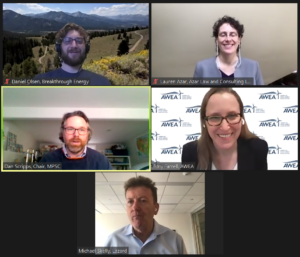
Yes, transmission expansion does serve the public interest, was the resounding answer from the last panel of the conference. Moderated by Amy Farrell, Senior Vice President of Government & Public Affairs at the American Wind Energy Association, the session featured panelists Lauren Azar, Principal at Azar Law LLC and Azar Consulting LLC; Dan Scripps, Chair of the Michigan Public Service Commission; Michael Skelly, Senior Advisor at Lazard; and Daniel Olsen, Research Scientist at Breakthrough Energy.
With decades of combined transmission policy and development experience between them, the speakers emphasized the benefits of transmission expansion, including accelerated decarbonization, job creation, increased grid reliability and cost savings for power consumers. The group suggested that FERC should carefully plan for transmission expansion and, at a minimum, fix Order 1000 to get interregional lines built. Panelists also discussed additional grid-enhancing technologies, such as advanced sensors and control systems to enhance transmission capacity and reliability, but noted that these were insufficient to meet all of our long-term grid needs.
Keynote Address by MISO CEO John Bear
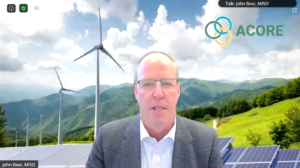
ACORE Grid Forum keynote speaker, John Bear, oversees the nation’s largest power market by geographic area. As CEO of the Midcontinent System Operator (MISO), he underscored that the clean energy transition is well underway, and transmission bottlenecks must be resolved to see it through. In a fitting summation he said, “If you love renewables, you have to love transmission.”
On behalf of the ACORE team, thank you to all who were able to attend ACORE’s first-ever virtual Grid Forum. Those who registered for the two-day Forum will be able to watch the program on our conference hub until December 18. Those who missed the chance to register for the Grid Forum and would like to access the content can reach out to events@acore.org to inquire about purchasing a post-event pass.
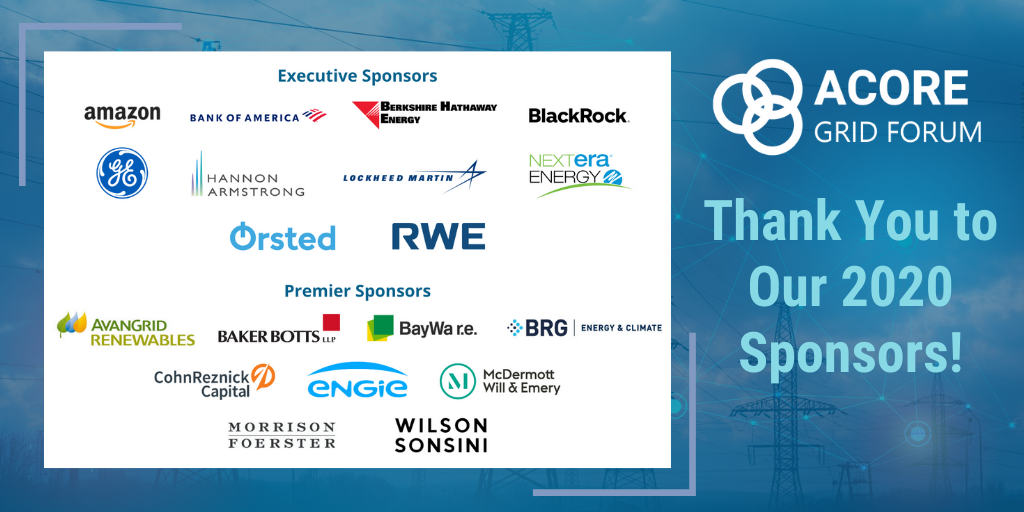
Join leaders from across the renewable energy sector.

What will our next 20 years look like? Here’s the truth: they’ll be better with ACORE at the forefront of energy policy.
Shannon Kellogg
Amazon Web Services (AWS)
